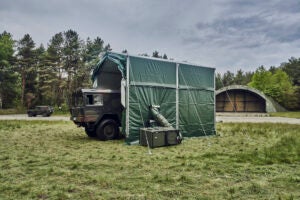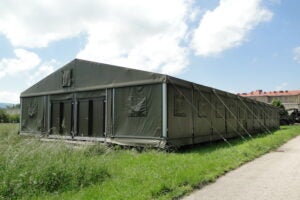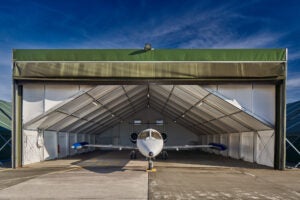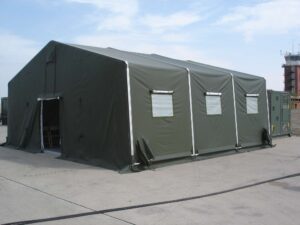New and Exclusive Carbon Hybrid Military Structures for Faster Deployment and Superior Performance
Designed and fully patented by HTS TENTIQ, the new lightweight carbon hybrid shelter series delivers an unparalleled combination of fast deployment with superior performance for military and humanitarian markets.
At the forefront of advanced technology and innovation the structures are engineered with a carbon aluminium profile which is considerably stronger, yet lighter in weight and deployed far quicker than comparable aluminium structures on the market.
With its packaged weight up to 35% less and packaged volume is up to 50% less, these state-of-the-art structures are fast and easy to transport and assemble whilst achieving maximum performance.
Whilst not comprising on its quality by using ground-breaking technology, the carbon hybrid shelter systems are able to withstand extreme weather conditions of higher snow and wind loadings and furthermore operate in extreme temperatures from -40°C to 80°C.
These market leading structures are designed and patented exclusively by HTS TENTIQ so you won’t be able to get these high spec shelters from anywhere else.
Some of our most popular structures can also benefit from this world class carbon hybrid profile such as toop shelters, multi-purpose shelters and maintenance shelters. Our structures are designed in modules making it easy to modify and add a variety of accessories such as flooring, walling, sunshades, insulation liners and HVAC.
HTS TENTIQ is a specialist military and humanitarian division of leading designer and manufacturer of temporary and semi-permanent clearspan structure systems, HTS TENTIQ. With more than 50 years industry experience, HTS TENTIQ uses a wealth of knowledge to design and manufacture a specialist range of lightweight, versatile, rapid-deployment temporary structure systems.
Operating from one of the most advanced production facilities of its kind in Kefenrod, Germany, advanced technology and innovation is at the heart of the business. HTS TENTIQ has been supplying military organisations with military hangars, shelters, tents and camps for around 25 years.







